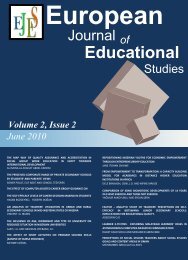principal's leadership behaviour as a determinant of effectiveness
principal's leadership behaviour as a determinant of effectiveness
principal's leadership behaviour as a determinant of effectiveness
Create successful ePaper yourself
Turn your PDF publications into a flip-book with our unique Google optimized e-Paper software.
Europan Journal <strong>of</strong> Educational Studies 2(1), 2010<br />
S/N<br />
My principal:<br />
Table 1: Principals’ <strong>leadership</strong> <strong>behaviour</strong><br />
Items<br />
Agree % Disagree %<br />
1. Provides good <strong>leadership</strong> <strong>of</strong> the school system. 1135 95.2 58 4.8<br />
2. Sees to members <strong>of</strong> staff welfare 1101 92.3 92 7.7<br />
3. Relates very well with his teachers. 1145 96.0 48 4.0<br />
4. Relates very well with his students 1124 94.2 69 5.8<br />
5. Involves teachers in decision-making 1053 88.3 140 11.7<br />
6. Feels every members <strong>of</strong> staff is relevant in the school<br />
system<br />
1114 93.4 79 6.6<br />
7. Praises hardworking teacher. 1114 93.4 79 6.6<br />
8. Encourage teachers to use their initiatives on their<br />
job.<br />
1123 94.1 70 5.9<br />
9. Makes the teachers have a sense <strong>of</strong> belonging 1106 92.7 87 7.3<br />
10. Is accessible to teachers 1125 94.3 68 5.7<br />
11. Makes available teaching materials 939 78.7 254 21.3<br />
12. Gives approval when teachers want to go for inservice<br />
training<br />
1041 87.3 152 12.7<br />
13. Sometimes delegates duties to teachers 1096 91.9 97 8.1<br />
14. Allows teachers to freely express their opinions in the<br />
meeting.<br />
1073 89.9 120 10.1<br />
Mean 91.6 8.4<br />
Results in table 1 shows that 96% <strong>of</strong> the respondents agreed that the principal relates very well with the<br />
teachers. While 95.2% <strong>of</strong> the respondents agreed that the principals provide good <strong>leadership</strong> <strong>of</strong> the school<br />
system, 94.3% <strong>of</strong> them agreed that the principal is always accessible to teachers. At the same time, 94.2% <strong>of</strong> the<br />
respondents agreed that the principal relates very well with his students.<br />
Of the respondents, 94.1% agreed that the principal encourages the staff the use their initiatives in their jobs,<br />
93.4% agreed that the principal feels every member <strong>of</strong> staff is relevant in the school system, while 93.4% also<br />
agreed that the principal praises hardworking teacher. The table also shows that 92.7% <strong>of</strong> the respondents<br />
agreed that the principal makes the teachers have a sense <strong>of</strong> belonging in the system, while 92.3% <strong>of</strong> them<br />
agreed that the principal sees to teachers’ welfare. Again, 91.9% <strong>of</strong> the respondents agreed that principals<br />
sometime delegates duties to teachers.<br />
By and large, it is shown in the table that 89.9% <strong>of</strong> the respondents agreed that the principal allows his members<br />
<strong>of</strong> staff to freely express their opinions in the meeting. 88.3% <strong>of</strong> them agreed that principals involve teachers in<br />
decision making. While 87.3% <strong>of</strong> the respondents agreed that principal; gives approval when teachers want to<br />
go for in-service training, 78.7% <strong>of</strong> them agreed that the principal makes available teaching materials.<br />
On the average, 91.6% <strong>of</strong> the respondents agreed that the <strong>behaviour</strong> <strong>of</strong> the principals towards the teachers <strong>as</strong><br />
well <strong>as</strong> the job is very encouraging.<br />
Extent <strong>of</strong> secondary school <strong>effectiveness</strong>: In analyzing the extent <strong>of</strong> secondary school <strong>effectiveness</strong> in the three<br />
domains <strong>of</strong> learning (cognitive, affective and psychomotor domains), Section C <strong>of</strong> SSEQ and the SSCE results<br />
for the three years (2005-2007) were used to analyse the responses on items 1-17 <strong>of</strong> section C <strong>of</strong> SSEQ in<br />
addition to the SSCE results. To determine whether or not the schools were effective, the mean responses were<br />
scored and tabulated and <strong>as</strong> for the cognitive domain, the average score for the three years were scored and<br />
tabulated. The result <strong>as</strong> revealed in table 2.<br />
28

















